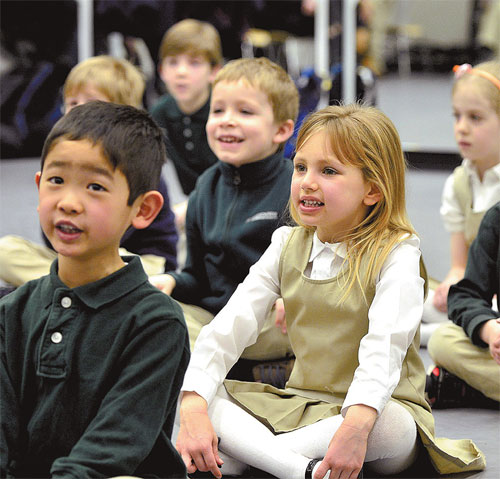Interest in Mandarin rising, slowly but surely
Updated: 2015-09-25 14:09
By Amy He in New York(China Daily USA)
|
||||||||
|
Children rehearse The Ballad of Mulan, a Chinese poem eulogizing Hua Mulan, the legendary woman warrior in Chinese ancient history, ahead of the Chinese dance show Legend of Mulan at the Lincoln Center in New York on March 8. Wang Lei / Xinhua |
Professionals increasingly want to learn Chinese language and how to do business there
When West Virginia University opened its Confucius Institute for Business in August, director Victor Chow said that one of its main goals was to get more Americans to study Chinese.
"Many Chinese know English, but very few Americans can understand Chinese. This is not a very symmetrical result," he told the Daily Athenaeum.
The number of Americans learning Mandarin is slowly but steadily increasing. A survey by the Modern Language Association shows that enrollment in Chinese language learning in the United States went from 59,876 in 2009 to 61,055 in 2013, an increase of 2 percent.
"Although enrollment grew by a relatively small percentage, nearly half the programs experienced an increase in enrollment," according to the association.
The China Institute in New York City, the oldest nonprofit Sino-American cultural organization in the U.S., has Mandarin programs for both adults and children.
Liao Shenzhan, director of education and dean of its Confucius Institute, said there is both an increase in interest among adult professionals, who hope to gain an edge by improving their language skills, and from children, whose parents want them to be "global citizens."
"In the past, a lot of our students included retirees or people who have a natural interest in learning Chinese," she told China Daily. "But recently, especially in the past five years, we've seen professionals and companies start to expand collaboration with China, and they really want to know not only the language, but also to understand how to do business with the Chinese."
The China Institute enrolls about 700 students a year across its child and adult programs. Basic adult classes cost $430 to $485 for 10 sessions, while children's classes for one semester cost around $850.
Liao said corporations have also begun hiring its instructors to give employees introductory lessons before business trips to China. Employers want their staff to have a basic understanding of the Chinese business culture, too.
For children, particularly toddlers, their parents are "very much in tune with opening their kids to different cultures, and because general interest in China has been rising over the years, it seems to be an area that naturally captures their attention," she said, adding that parents are thinking down the road to advance their child's proficiency in a language other than English to get them ready for college and "for the 21st century."
In New York City, more than 10,000 middle and high school students at 69 schools studied Chinese during the 2013-14 academic year.
Michele Heryford, director of the University of Pittsburgh Confucius Institute, oversees Mandarin programs at 70 schools across 19 counties in Pennsylvania, Ohio and New York. Instructors with her institute taught about 4,600 students over the 2014-15 school year.
"From my experience in the past couple of years, I see a lot more interest," she said. "We've had an exponential hike in enrollment, and I think that usually has to do with what people perceive to be the economic benefits of learning Mandarin and learning it as early as possible.
"Another reason is that, as schools look to retool to keep their school districts high-performing or seen as really relevant, they add Chinese to add a competitive edge for their kids, as well."
The Pittsburgh Confucius Institute is one of 97 across the U.S. The Office of Chinese Language Council International, also known as Hanban, launched the institutes in 2004 to promote cultural learning through teaching Chinese as a foreign language.
Clair Ward, head of Valley School of Ligonier, which is participating in the Pittsburgh institute's language program, said her school believes exposing students to Mandarin at an early age is beneficial.
"If they're exposed to native-speaking Chinese as well as nonnative-speaking English speakers, they're getting culturally enhanced," she said of students in kindergarten through to ninth grade. "The parents just wish we could do more and more and more."
amyhe@chinadailyusa.com
- LatAm experts praise Xi on yuan, globalization
- France launches air strikes against Islamic State in Syria
- Women's rights are human rights, German chancellor says
- Hajj death toll rises to 769, Iran denounces 'crime'
- Russia's military build-up in Syria reinvigorates political solution
- Musical greetings
-
 Xi makes four-point proposal on promoting women's rights
Xi makes four-point proposal on promoting women's rights -
 China gifts the UN 'Zun of Peace' for 70th anniversary
China gifts the UN 'Zun of Peace' for 70th anniversary -
 Xi calls for equitable, open, all-round development
Xi calls for equitable, open, all-round development 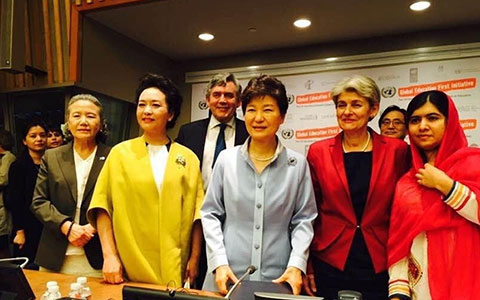
 First Lady Peng delivers speech in English at UN
First Lady Peng delivers speech in English at UN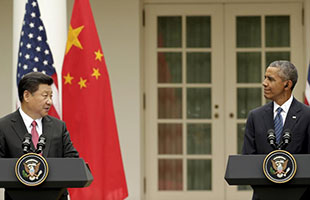
 Three Xi-Obama meetings: From casual to black tie
Three Xi-Obama meetings: From casual to black tie
 Xi pledges $2 billion to help developing countries
Xi pledges $2 billion to help developing countries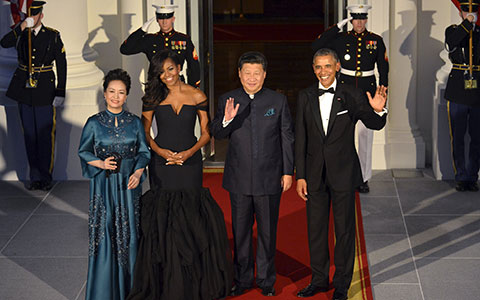
 White House hosts state dinner for President Xi
White House hosts state dinner for President Xi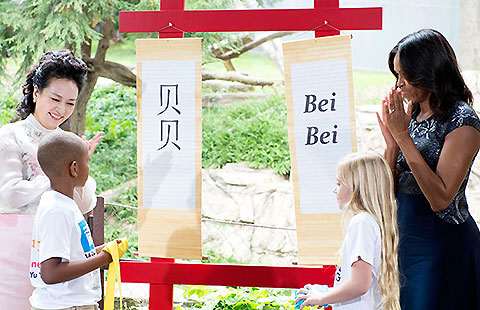
 First ladies name giant panda cub 'Bei Bei' in Washington
First ladies name giant panda cub 'Bei Bei' in Washington
Most Viewed
Editor's Picks

|

|

|

|

|

|
Today's Top News
Xi pledges $2 billion to help developing countries
Young people from US look forward to Xi's state visit: Survey
US to accept more refugees than planned
Li calls on State-owned firms to tap more global markets
Apple's iOS App Store suffers first major attack
Japan enacts new security laws to overturn postwar pacifism
Court catalogs schools' violent crimes
'Beauty of Beijing's alleys akin to a wise, old person'
US Weekly

|

|
